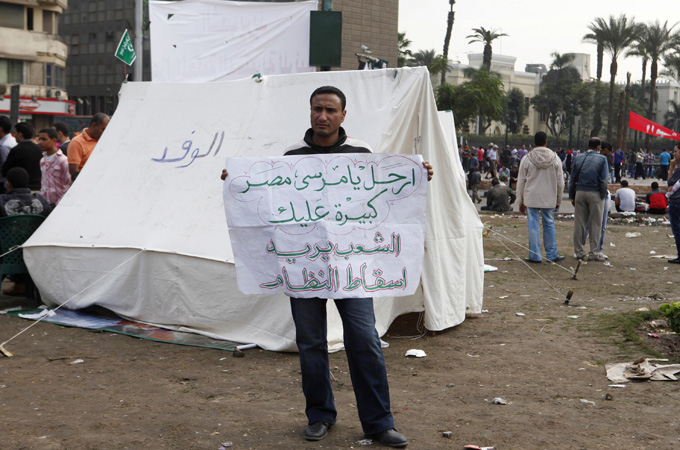Egypt’s top judges condemn Morsi’s decree
Supreme Judicial Council calls president’s decision to grant himself sweeping new powers an “unprecedented attack”.

The Supreme Judicial Council, Egypt’s highest judicial authority, described President Mohamed Morsi’s decision to grant himself controversial new powers that would put him above the judiciary as an “unprecedented attack”.
In an emergency meeting on Saturday, the council urged Morsi “to distance this decree from everything that violates the judicial authority”.
Al Jazeera’s Hoda Abdel-Hamid, reporting from Cairo, said that the Judges’ Club has also voiced its anger at the decree.
“With the president giving himself the right to issue decrees or rules that are binding and can not be appealed, they’re saying that never in the history of modern Egypt has there been a president who gave himself so many powers,” said Abdel-Hamid.
 |
| A Cairo protester’s sign reads: “Go away Morsi, Egypt is too big for you. People want the fall of the regime” [Reuters] |
Morsi’s constitutional decree does say that these powers are temporary and in effect until a new constitution is written, gone to referendum and a new parliament is voted in.
“However, the judges say…what is the guarantee that it is for a temporary amount of time. They say you can not have a president who is accountable to no one,” said our correspondent.
Morsi’s announcement on Thursday sparked large protests across Egypt on Friday. Minor clashes broke out on Saturday when demonstrators on Mohamed Mahmoud Street near Tahrir Square threw rocks at security forces, who fired back with tear gas.
Insisting upon the need to root out what he called “weevils eating away at the nation of Egypt”, Morsi said on Friday: “I don’t like, want or need to resort to exceptional measures, but I will if I see that my people, nation and the revolution of Egypt are in danger”.
“I don’t want to have all the powers…but if I see my nation in danger, I will do and I will act. I must,” said Morsi, addressing hundreds of his supporters who rallied outside the presidential palace in Cairo.
Morsi – who has been buoyed by accolades recently for mediating a truce between Hamas and Israel – had ordered on Thursday that an assembly dominated by the Muslim Brotherhood writing the new constitution could not be dissolved by legal challenges.
Liberal and secular members earlier walked out of the body, charging it would impose strict Islamic practises.
His announcement led to clashes in several cities between supporters and opponents of Egypt’s president, a clear show of the deepening polarisation plaguing the country.
One hundred wounded
In the largest rally on Friday, thousands of chanting protesters packed Cairo’s Tahrir Square, the heart of the 2011 revolution, demanding Morsi quit and accusing him of launching a “coup”.
Thousands of protesters gathered in Tahrir Square after opposition leaders called for a “million-man march” to protest against what they say is a coup by Morsi.
On Friday, protesters were calling for the fall of Morsi’s government and the fall of the Muslim Brotherhood.
Among the protesters was Mohamed ElBaradei, the former head of the International Atomic Energy Agency. On Thursday, ElBaradei – who also participated in the 2011 protests – tweeted that Morsi had “appointed himself Egypt’s new pharaoh”.
A number of people camped out overnight in the square in what they say will be a one-week sit-in, and leftist and liberal parties have scheduled a march for Tuesday.
Protesters like Ahmed Moamen say they feel betrayed by Morsi. “I am not happy with actions of the Muslim Brotherhood and of Morsi,” he told the Associated Press. “I am one of the people who voted for Morsi, but I am disappointed in him.”
In Alexandria, Port Said and Suez, protests turned violent and at least 100 people were wounded in clashes between Morsi’s supporters and opponents.
The headquarters of Morsi’s Freedom and Justice Party headquarters in Alexandria was set on fire by protesters on Friday afternoon, with the party’s offices have been attacked in five cities in total.
‘Huge ramifications’
Morsi has also given himself sweeping powers that allowed him to sack the unpopular prosecutor general and opened the door for a retrial for Mubarak and his aides.
At a press conference on Saturday, Abdel-Meguid Mahmoud said that he is willing to go to court to disptue Moris’s decision and warned “againt any attempt to disrupt the work of the judicial system”.
Morsi’s decree raises very serious human rights concerns, a spokesperson for the UN Human Rights Commissioner Navi Pillay said on Friday.
“We are very concerned about the possible huge ramifications of this declaration on human rights and the rule of law in Egypt,” Rupert Colville said at the UN in Geneva.
“We also fear this could lead to a very volatile situation over the next few days.”
Hassan Nafaa, professor of political science at Cairo University, told Al Jazeera that Morsi “is erecting himself as an absolute monarch” because he did not consult the opposition on the decision.
“The problem is not about the content of the decisions itself, but about the way it was taken,” he said.
US State Department spokeswoman Victoria Nuland said Morsi’s actions raise “concerns” for many Egyptians and the international community, and said the US urged “all Egyptians to resolve their differences over these important issues peacefully and through democratic dialogue”.